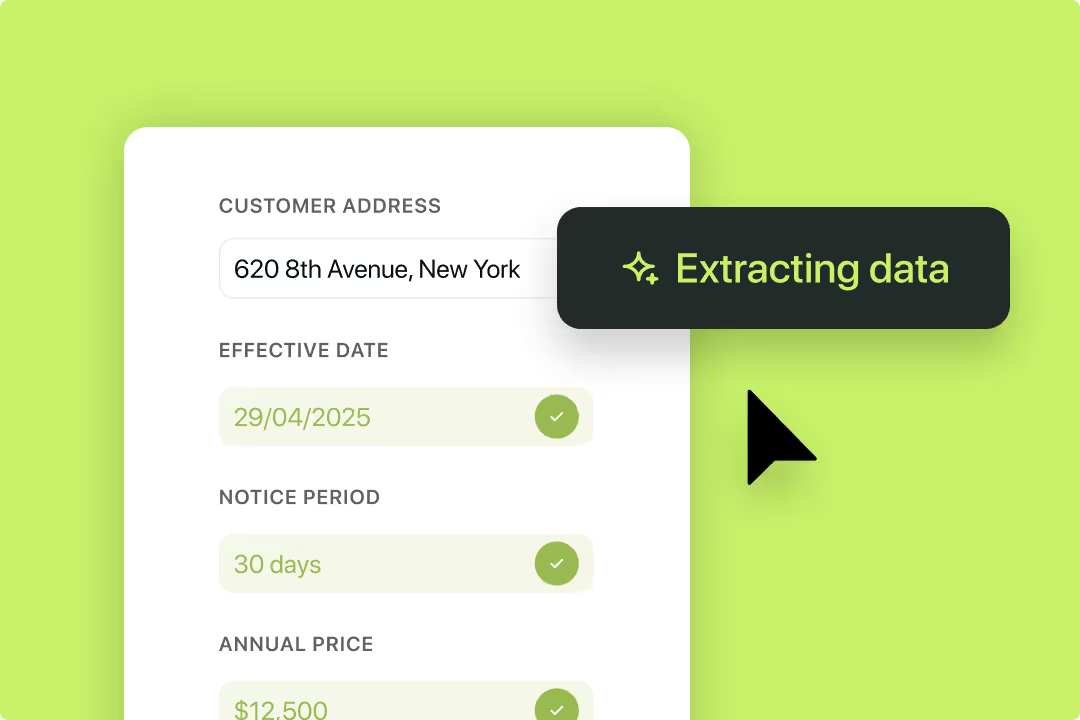Solutions
Customer Support
Resources
There’s no universal rule for how long a contract should last. But that doesn’t mean duration doesn’t matter.
It can influence pricing, the length of a commercial relationship, and whether a contract renews or quietly expires.
Take SaaS agreements: customers are often offered discounts to commit to longer terms, improving predictability and reducing churn.
Similarly, real estate contracts—like commercial leases—typically favour longer durations to lock in tenants and provide stability for landlords.
In short, there are plenty of reasons why contract duration can and should vary from case to case.
But what exactly is contract duration, and how can businesses manage it more effectively to drive revenue and avoid missed renewals? Let’s start with a definition.
Contract duration refers to the period during which a contract is active and enforceable. It typically begins on the contract’s effective date and ends on the contract’s termination date, both of which should be clearly stated in the agreement.
Without a defined duration, it’s unclear when contractual obligations start and stop. That ambiguity can lead to disputes, missed deadlines, or financial loss. In other words: no contract should exist without a clear timeframe that underpins it.

Like all contract terms, duration is mutually agreed upon by the parties involved.
Typically, one side drafts the initial contract with a proposed timeframe, which the counterparty can either accept or negotiate. Once agreed, the document is signed—either electronically or in wet ink—and the contract becomes binding.
There’s a common misconception that every contract should follow a standard duration. In reality, the “right” length for a contract depends on a range of factors, including the nature of the agreement, the obligations involved, and the relationship between the parties.
Here are a few considerations that shape contract duration:
Different contracts demand different timelines. For example, SaaS agreements often follow a subscription model—typically annual, or multi-year for enterprise plans. Meanwhile, employment contracts may be open-ended, unless they’re for fixed-term roles.
Duration should align with how long it realistically takes to deliver on the contract. Parties need to negotiate timelines that reflect the actual scope of work or deliverables.
Some contracts include conditions for ending the agreement ahead of schedule. This could be due to anything from unmet obligations or external changes. Factoring these into the duration can offer flexibility without losing control.
For new relationships, shorter terms provide a low-risk trial period. But when there’s an established history of trust and performance, longer durations can offer stability and reduce the administrative burden of frequent renewals.
Failing to track contract duration isn’t just an administrative oversight, it’s a serious risk that can lead to financial loss, operational inefficiency, and damaged relationships. Here’s just a brief overview of what’s at stake:
Without visibility over when a contract starts or ends, you risk missing renewal windows, notice periods, or key delivery milestones. This can result in services continuing (and being billed) unnecessarily—or ending abruptly with no time to pivot.
When you don’t know the duration, you can’t price accurately. That means you might continue paying for a service you no longer need, or fail to charge a client for time you’re still actively delivering work.
Many contracts include automatic renewal clauses. If you’re not tracking end dates or notice periods, you could be locked into another full term of an agreement that no longer suits your needs, or worse, one you planned to exit.
When your business is small, tracking a handful of contracts manually might work. But as you scale, fragmented storage and inconsistent date tracking make it impossible to maintain control across teams and departments.

When all of these risks compound, it’s easy to see how contract value leakage costs businesses up to 9 per cent of their annual turnover on average.
Fortunately, it doesn't have to be this way. Intelligent contract repositories like Juro make it quicker and easier than ever to track and manage the duration of your contracts. More on that below.
If you’re still managing contract dates manually (or missing them entirely) it’s time to upgrade your approach.
With Juro, businesses can:

Managing contract duration doesn’t have to be a guessing game. With Juro’s contract automation platform, you get full visibility into your contract timelines, so you can act with confidence and never miss a renewal again.
To see Juro's contract tracking functionality in action, book a personalized demo of the platform today.

Lorem ipsum dolor sit amet, consectetur adipiscing elit. Suspendisse varius enim in eros elementum tristique. Duis cursus, mi quis viverra ornare, eros dolor interdum nulla, ut commodo diam libero vitae erat. Aenean faucibus nibh et justo cursus id rutrum lorem imperdiet. Nunc ut sem vitae risus tristique posuere.

